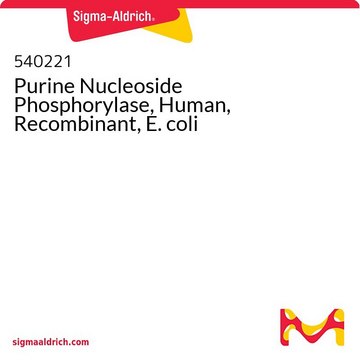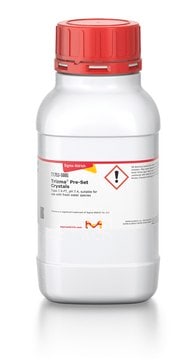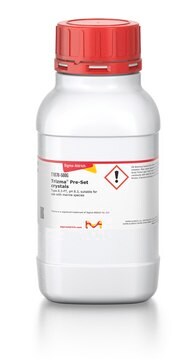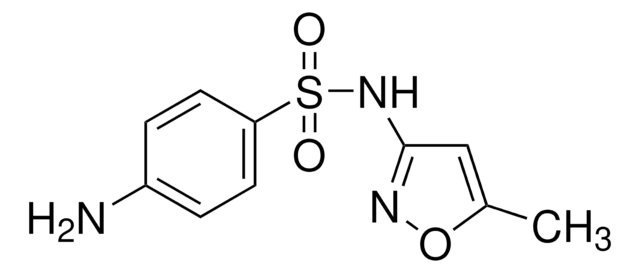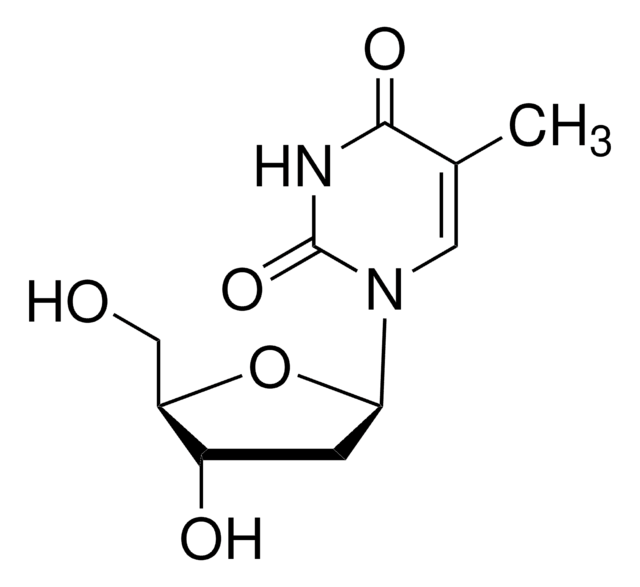T2807
Thymidine Phosphorylase, recombinant from Escherichia coli
recombinant, expressed in E. coli, buffered aqueous solution, ≥500 units/mL
Sinonimo/i:
Thymidine:orthophosphate deoxy-D-ribosyltransferase
Autenticatiper visualizzare i prezzi riservati alla tua organizzazione & contrattuali
About This Item
Numero CAS:
Numero MDL:
Codice UNSPSC:
12352204
NACRES:
NA.54
Prodotti consigliati
Ricombinante
expressed in E. coli
Livello qualitativo
Stato
buffered aqueous solution
Concentrazione
≥500 units/mL
N° accesso UniProt
Temperatura di conservazione
2-8°C
Informazioni sul gene
Escherichia coli K12 ... deoA(948901)
Cerchi prodotti simili? Visita Guida al confronto tra prodotti
Descrizione generale
Thymidine phosphorylase inhibits vascular smooth muscle cell proliferation.
Applicazioni
Thymidine phosphorylase has been used in a study to assess TAS-102 treatment in patients with advanced solid tumors. Thymidine phosphorylase has also been used in a study to investigate antitumor effects of the FP3 protein on patient-derived tumor tissue xenograft models of primary colon carcinoma.
Azioni biochim/fisiol
An enzyme that catalyzes the reversible conversion of thymidine to thymine. Thymidine phosphorylase is part of the pyrimidine nucleoside salvage pathway.
An enzyme that catalyzes the reversible conversion of thymidine to thymine. Thymidine phosphorylase is part of the pyrimidine nucleoside salvage pathway. This pathway allows pyrimidine bases to be recycled for nucleotide biosynthesis, while the pentose 1-phosphates are converted to intermediates of the pentose phosphate shunt and glycolysis. The E. coli thymidine phosphorylase shares 40% sequence homology with the human sequence, which has been found to be identical to the angiogenic agent platelet-derived endothelial growth factor. The purified E. coli enzyme has been shown to stimulate blood vessel growth in chick chorioallantoic membrane assays.
Definizione di unità
One unit will convert 1.0 μmole each of thymidine and phosphate to thymine and 2-deoxyribose 1-phosphate per min at pH 7.4 at 25°C.
Stato fisico
Solution in 0.5 M potassium phosphate containing 2 mM uracil, 0.02% sodium azide and bovine serum albumin
Nota sulla preparazione
Cloned from E. coli and produced in overexpressing E. coli
Codice della classe di stoccaggio
12 - Non Combustible Liquids
Classe di pericolosità dell'acqua (WGK)
WGK 2
Punto d’infiammabilità (°F)
Not applicable
Punto d’infiammabilità (°C)
Not applicable
Dispositivi di protezione individuale
Eyeshields, Gloves, multi-purpose combination respirator cartridge (US)
Scegli una delle versioni più recenti:
Possiedi già questo prodotto?
I documenti relativi ai prodotti acquistati recentemente sono disponibili nell’Archivio dei documenti.
I clienti hanno visto anche
Domenico Ribatti et al.
Expert opinion on therapeutic targets, 16(12), 1215-1225 (2012-09-18)
Several anti-angiogenic agents have been developed and some of them have been clinically applied in the tumor therapy. Anti-angiogenic therapy faces some hurdles: inherent or acquired resistance, increased invasiveness, and lack of biomarkers. Characterization of tumor endothelial markers may help
T Doi et al.
British journal of cancer, 107(3), 429-434 (2012-06-28)
TAS-102 consists of α, α, α-trifluorothymidine (TFT) and an inhibitor of thymidine phosphorylase (TPI). We conducted a dose-escalation phase I study in Japanese patients with advanced solid tumours. TAS-102 was administered twice daily on days 1-5 and days 8-12 in
Jian Zhang et al.
Cancer chemotherapy and pharmacology, 71(1), 103-113 (2012-10-12)
The difference between combinational and pre-planned sequential therapies using regimens that include non-anthracycline and taxane in the first-line setting remains unclear. The purpose of this study is to explore the interaction between vinorelbine (N) and capecitabine (X) in breast cancer
Alexandra Giatromanolaki et al.
Cancer biology & therapy, 13(13), 1284-1289 (2012-08-17)
Tumor-associated stroma (TAS) is not simply a supporting element for cancer cells, but plays an important role in tumor growth, invasion and metastasis. Changes on the level of stromal constituents, such as loss of Caveolin-1 and increased thymidine phosphorylase (TP)
Lian Lu et al.
Oncology reports, 28(4), 1332-1338 (2012-07-25)
Vascular endothelial growth factor (VEGF) is an important signaling protein and a predominant mediator of angiogenesis in tumor growth and metastasis. Therefore, antagonism of the VEGF pathway results in inhibition of abnormal angiogenesis, then suppression of tumor growth and metastasis.
Il team dei nostri ricercatori vanta grande esperienza in tutte le aree della ricerca quali Life Science, scienza dei materiali, sintesi chimica, cromatografia, discipline analitiche, ecc..
Contatta l'Assistenza Tecnica.

